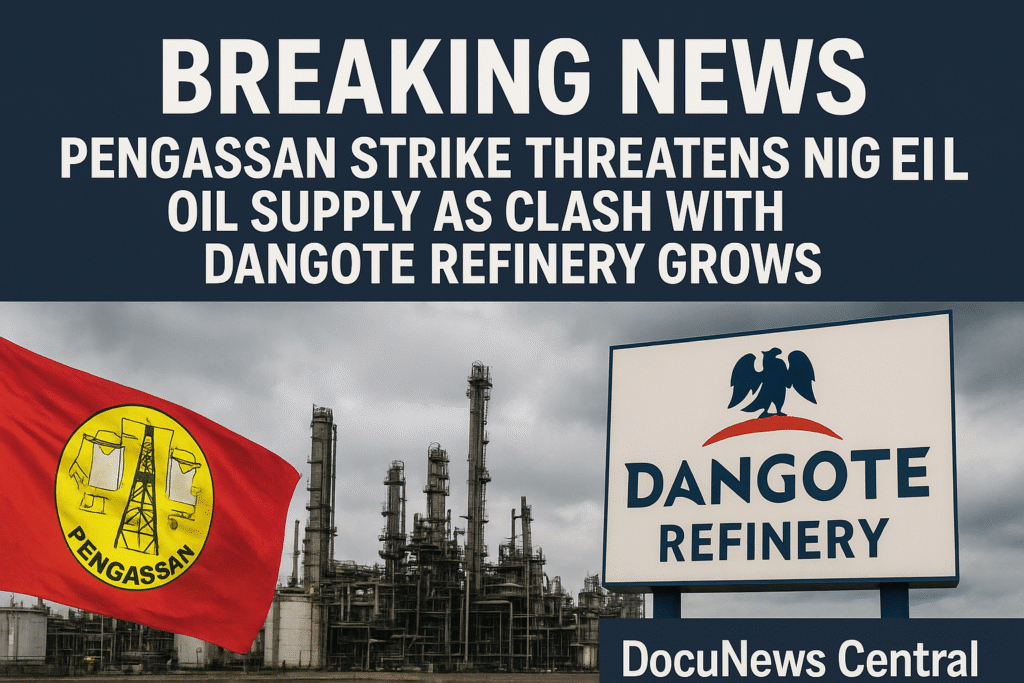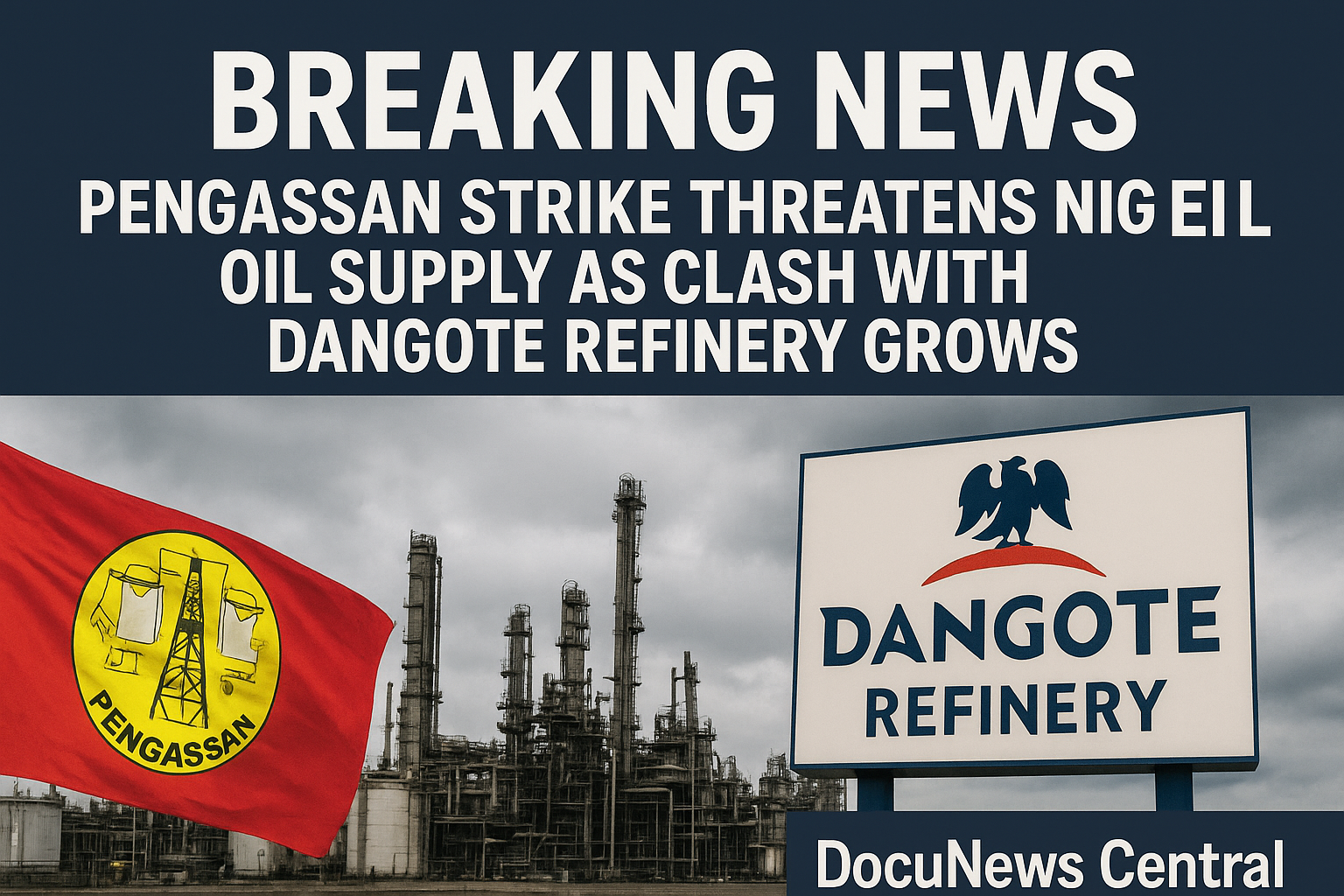
PENGASSAN Strike Threatens Nigeria’s Oil Supply as Clash With Dangote Refinery Grows
A New Oil Crisis Unfolds
Nigeria is on edge as a major labour row erupts in the oil and gas industry.
The Petroleum and Natural Gas Senior Staff Association of Nigeria, known as PENGASSAN, has declared a nationwide strike.
Its leaders say the strike will begin at 12:01 a.m. on Monday, September 29, 2025.
They accuse the Dangote Refinery of mass sackings and unfair treatment of workers.
This conflict has already shaken the nation’s oil supply network and raised fears of a wider energy crisis.
How the Dispute Began
The tension began after reports that hundreds of workers were removed from their jobs at the Dangote Refinery.
Union leaders say more than 800 staff were dismissed for joining the union.
They call the move an attack on workers’ rights and a threat to union freedom.
Dangote officials reject the accusation.
They insist that the company only made routine staff changes to improve operations.
PENGASSAN responded with warnings and demands.
It asked the refinery to reinstate the workers and start talks to protect their rights.
When these demands were not met, the union decided to take stronger action.
Strike Notice Issued Nationwide
On Friday, September 26, PENGASSAN sent letters to all its branches.
The letters ordered members in every oil and gas company to prepare for a full shutdown.
The notice set 12:01 a.m. Monday, September 29 as the start time for the strike.
Union members were told to withdraw their services and stop gas and crude supply to the Dangote Refinery.
The union also asked its field and mobile staff to stop operations from 6:00 a.m. Sunday, September 28.
This step was meant to ensure that supplies to the refinery would stop before the strike began.
Union leaders said the shutdown will continue until their demands are met. read also EU step up border defense: massive drone wall planned docunewscentral.com
Dangote Management Denies Wrongdoing
The Dangote Group has rejected the claims of mass sackings and unfair treatment.
In a statement, the company said it is simply reorganising its workforce to boost efficiency.
It insists that it did not punish workers for union activity.
Company officials describe the union’s move as illegal and harmful to the nation’s economy.
They warn that cutting crude and gas supply to the refinery amounts to economic sabotage.
Dangote says it is open to dialogue but will not accept threats that hurt the country’s energy sector.
Government Steps In
The House of Representatives has joined the call for calm.
Lawmakers have urged PENGASSAN to suspend the strike and return to talks.
They warn that a nationwide stoppage could cripple the country’s economy.
Members of the House say the dispute can be settled through dialogue and not force.
They appeal to both sides to seek a peaceful solution.
The lawmakers fear that a long shutdown could damage investor confidence in Nigeria’s oil and gas industry. for more verified news like ours visit legit.com
Fear of Shortages and Higher Prices
The threat of a nationwide strike has already caused worry across Nigeria.
Fuel marketers fear that petrol, diesel and aviation fuel may soon run short.
Many filling stations are preparing for possible panic buying and long queues.
Energy experts say a long strike could raise prices of fuel and power.
Gas plants and industries may also face supply cuts.
The Dangote Refinery is a key part of Nigeria’s plan to reduce fuel imports.
Any disruption to its work will hurt the local market and increase pressure on the naira.
Union’s Demands
PENGASSAN has listed key demands before it will end the strike.
It wants the refinery to recall all workers dismissed for union activity.
It seeks a written agreement to protect workers’ rights to join unions.
The union also calls for talks with government and industry leaders to prevent future disputes.
Union leaders say their action is not against Nigeria but for the rights of its workers.
They claim that if the refinery continues with the dismissals, other companies may copy the same practice.
Dangote’s Position
The Dangote Group continues to defend its actions.
It says that staff changes were part of a normal business process.
The company insists it has not violated labour laws or attacked workers’ rights.
Dangote officials say they will work with authorities to keep the refinery running.
They stress that the plant is key to Nigeria’s energy security.
The company asks PENGASSAN to return to talks to avoid damage to the economy.
Possible Economic Impact
Economists warn that a nationwide strike in the oil sector could cause major losses.
Nigeria depends on oil and gas for most of its revenue and foreign exchange.
A full shutdown would reduce exports and cut government income.
Power generation could also suffer if gas supply is halted.
Industries that rely on gas and petroleum products may face closures or production cuts.
Transport costs could rise as fuel becomes scarce, adding pressure to inflation.
Public Reaction
Nigerians have mixed feelings about the strike.
Some support the union’s fight for workers’ rights and fair treatment.
Others fear that the action will worsen the cost of living and disrupt daily life.
On social media, many urge both sides to settle quickly.
They worry that the strike could trigger a chain reaction across the economy.
History of PENGASSAN Strikes
PENGASSAN has a long record of industrial action in Nigeria.
Past strikes have often caused fuel shortages and economic losses.
The union is known for its strong influence in the oil and gas industry.
This latest dispute shows the union’s willingness to use its power when it believes workers’ rights are under threat.
Analysts Call for Dialogue
Energy analysts say the crisis must be resolved through dialogue.
They warn that a prolonged dispute will damage Nigeria’s energy sector and scare investors.
Experts advise the government to act as a neutral mediator.
They also urge Dangote to be open to compromise and PENGASSAN to avoid actions that harm the nation.
Risks to Nigeria’s Energy Goals
Nigeria has been working to reduce its heavy dependence on imported fuel.
The Dangote Refinery is central to that plan.
If the refinery is forced to cut production or stop work, the country will face more imports and higher costs.
The strike also threatens Nigeria’s plan to boost local jobs and energy security.
Investors may become cautious if they see continued labour unrest.
Next Steps
Talks between the government, the union and Dangote are expected to continue through the weekend.
Observers say the next 48 hours are critical to avoid a total shutdown.
If the strike goes ahead as planned on Monday, fuel and gas supply may be disrupted across Nigeria.
Both the union and the company have much to lose if the dispute continues.
The nation’s economy, already under pressure, could suffer fresh shocks.
What Nigerians Should Expect
If the strike begins on Monday, fuel queues may appear within days.
Airlines could face flight delays or cancellations due to aviation fuel shortages.
Factories that rely on gas could slow or stop production.
Transport costs may rise, affecting the prices of food and goods.
Power plants that use gas may cut supply, causing more blackouts.
Calls for Quick Resolution
Business groups, civic groups and ordinary Nigerians are calling for a quick settlement.
They ask the government to mediate and ensure that talks resume.
They also appeal to both parties to put the nation’s interest above all else.
Without a deal, the strike could turn a labour dispute into a national crisis.
A peaceful solution would protect workers’ rights and keep the economy stable.
Conclusion
Nigeria stands at a crossroads.
The dispute between PENGASSAN and the Dangote Refinery is more than a fight over jobs.
It is a test of how the country balances workers’ rights with the need for economic stability.
The hours ahead will show whether dialogue can win over confrontation.
A nationwide strike will hurt everyone, from workers to business owners and ordinary citizens.
All eyes are now on the government, the union and the Dangote Group as the clock ticks toward Monday.












Thanks for sharing. I read many of your blog posts, cool, your blog is very good.